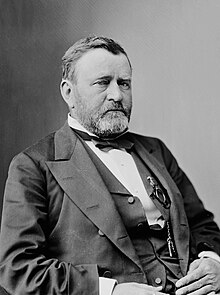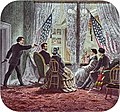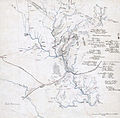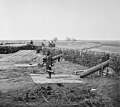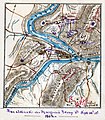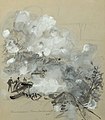 |
 |
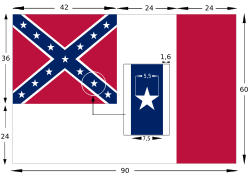
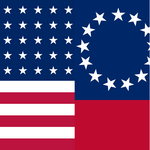
The American Civil War (1861–1865) was a sectional rebellion against the United States of America by the Confederate States, formed of eleven southern states' governments which moved to secede from the Union after the 1860 election of Abraham Lincoln as President of the United States. The Union's victory was eventually achieved by leveraging advantages in population, manufacturing and logistics and through a strategic naval blockade denying the Confederacy access to the world's markets.
In many ways, the conflict's central issues – the enslavement of African Americans, the role of constitutional federal government, and the rights of states – are still not completely resolved. Not surprisingly, the Confederate army's surrender at Appomattox on April 9,1865 did little to change many Americans' attitudes toward the potential powers of central government. The passage of the Thirteenth, Fourteenth and Fifteenth amendments to the Constitution in the years immediately following the war did not change the racial prejudice prevalent among Americans of the day; and the process of Reconstruction did not heal the deeply personal wounds inflicted by four brutal years of war and more than 970,000 casualties – 3 percent of the population, including approximately 560,000 deaths. As a result, controversies affected by the war's unresolved social, political, economic and racial tensions continue to shape contemporary American thought. The causes of the war, the reasons for the outcome, and even the name of the war itself are subjects of much discussion even today. (Full article)

The Bixby letter is a brief, consoling message sent by President Abraham Lincoln in November 1864 to Lydia Parker Bixby, a widow living in Boston, Massachusetts, who was thought to have lost five sons in the Union Army during the American Civil War. Along with the Gettysburg Address and his second inaugural address, the letter has been praised as one of Lincoln's finest written works and is often reproduced in memorials, media, and print.
Controversy surrounds the recipient, the fate of her sons, and the authorship of the letter. Bixby's character has been questioned (including rumored Confederate sympathies), at least two of her sons survived the war, and the letter was possibly written by Lincoln's assistant private secretary, John Hay. (Full article...)
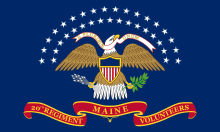
As a fervently abolitionist and strongly Republican state, Maine contributed a higher proportion of its citizens to the Union armies than any other, as well as supplying money, equipment and stores. No land battles were fought in Maine. The only episode was the Battle of Portland Harbor (1863) that saw a Confederate raiding party thwarted in its attempt to capture a revenue cutter.
Abraham Lincoln chose Maine's Hannibal Hamlin as his first Vice President. The future General Joshua L. Chamberlain and the 20th Maine Volunteer Infantry Regiment played a key role at the Battle of Gettysburg, and the 1st Maine Heavy Artillery Regiment lost more men in a single charge during the siege of Petersburg than any Union regiment in the war. (Full article...)
Ulysses S. Grant (born Hiram Ulysses Grant; April 27, 1822 – July 23, 1885) was an American military officer and politician who served as the 18th president of the United States from 1869 to 1877. As commanding general, Grant led the Union Army to victory in the American Civil War in 1865 and briefly served as U.S. secretary of war. An effective civil rights executive, Grant signed a bill to create the Justice Department and worked with Radical Republicans to protect African Americans during Reconstruction.
Grant was born in Ohio and graduated from West Point in 1843. He served with distinction in the Mexican–American War, but resigned from the army in 1854 and returned to civilian life impoverished. In 1861, shortly after the Civil War began, Grant joined the Union Army and rose to prominence after securing Union victories in the western theater. In 1863, he led the Vicksburg campaign that gave Union forces control of the Mississippi River and dealt a major strategic blow to the Confederacy. President Abraham Lincoln promoted Grant to lieutenant general after his victory at Chattanooga. For thirteen months, Grant fought Robert E. Lee during the high-casualty Overland Campaign which ended with capture of Lee's army at Appomattox, where he formally surrendered to Grant. In 1866, President Andrew Johnson promoted Grant to General of the Army. Later, Grant broke with Johnson over Reconstruction policies. A war hero, drawn in by his sense of duty, Grant was unanimously nominated by the Republican Party and then elected president in 1868. (Full article...)
- ... that the only functioning secondary school in Mississippi during the American Civil War was founded by Thomas S. Gathright?
- ... that Francis Orray Ticknor was a country doctor whose fame as a poet relies on "Little Giffen", a poem about one of his patients who died in the American Civil War?
- ... that Romeo and Juliet both served in the Union Navy?
- ... that Byron Root Pierce was Michigan's last living Civil War general?
- ... that Colonel Bradley Winslow was brevetted by US president Abraham Lincoln for "brave and gallant conduct" during the siege of Petersburg in the American Civil War?
- ... that after the Little Rock campaign, Union forces held three-quarters of Arkansas?
- Attention needed
- ...to referencing and citation • ...to coverage and accuracy • ...to structure • ...to grammar • ...to supporting materials
- Popular pages
- Full list
- Cleanup needed
- The West Tennessee Raids
- Requested articles
- James Ashby (soldier) • Bluffton expedition • Benjamin D. Fearing • Charles A. Hickman • Richard Henry Jackson • James B. Speers • Charles S. Steedman • Battle of Barton's Station • Lawrence P. Graham • Thomas John Lucas • Daniel Henry Rucker • James Hughes Stokes • Frederick S. Sturmbaugh • Davis Tillson • Action at Nineveh (currently a redirect) • International response to the American Civil War • Spain and the American Civil War • Savannah Campaign Confederate order of battle • Native Americans in the American Civil War (currently disambiguation after deletion) • 1st Battalion, Mississippi Mounted Rifles (Union) • Battle of Lafayette • Requested American Civil War Medal of Honor recipients
- Expansion needed
- Battle of Boonsborough • Battle of Guard Hill • Battle of Rice's Station • Battle of Simmon's Bluff • Battle of Summit Point • Charleston Arsenal • Edenton Bell Battery • First Battle of Dalton • Blackshear Prison • Edwin Forbes • Hiram B. Granbury • Henry Thomas Harrison • Louis Hébert (colonel) • Benjamin G. Humphreys • Maynard Carbine • Hezekiah G. Spruill • Smith carbine • Edward C. Walthall • Confederate States Secretary of the Navy • Confederate States Secretary of the Treasury • David Henry Williams • Battle of Rome Cross Roads • Delaware in the American Civil War • Ironclad Board • United States Military Railroad • Kansas in the American Civil War • Rufus Daggett • Ebenezer Magoffin • Confederate Quartermaster-General's Department • First Corps, Army of Northern Virginia • Francis Laurens Vinton • Henry Maury • Smith's Expedition to Tupelo • Other American Civil War battle stubs • Other American Civil War stubs
- Images needed
- Battle of Lone Jack • Preston Pond, Jr. • Melancthon Smith
- Merging needed
- 1st Regiment New York Mounted Rifles and 7th Regiment New York Volunteer Cavalry
- Citations needed
- 1st Alabama Cavalry Regiment (Union) • 4th Maine Battery • 33rd Ohio Infantry • 110th New York Volunteer Infantry • Battle of Hatcher's Run • Camp Dennison • Confederate colonies • CSS Resolute • Dakota War of 1862 • Florida in the American Civil War • Ethan A. Hitchcock (general) • Fort Harker (Alabama) • Gettysburg (1993 film) • Iowa in the American Civil War • Second Battle of Fort Sumter • Samuel Benton
- Translation needed
- Add an article here!
The following Wikimedia Foundation sister projects provide more on this subject:
-
Commons
Free media repository -
Wikibooks
Free textbooks and manuals -
Wikidata
Free knowledge base -
Wikinews
Free-content news -
Wikiquote
Collection of quotations -
Wikisource
Free-content library -
Wikiversity
Free learning tools -
Wikivoyage
Free travel guide -
Wiktionary
Dictionary and thesaurus
- Shortcuts to this page: Portal:ACW • P:ACW
